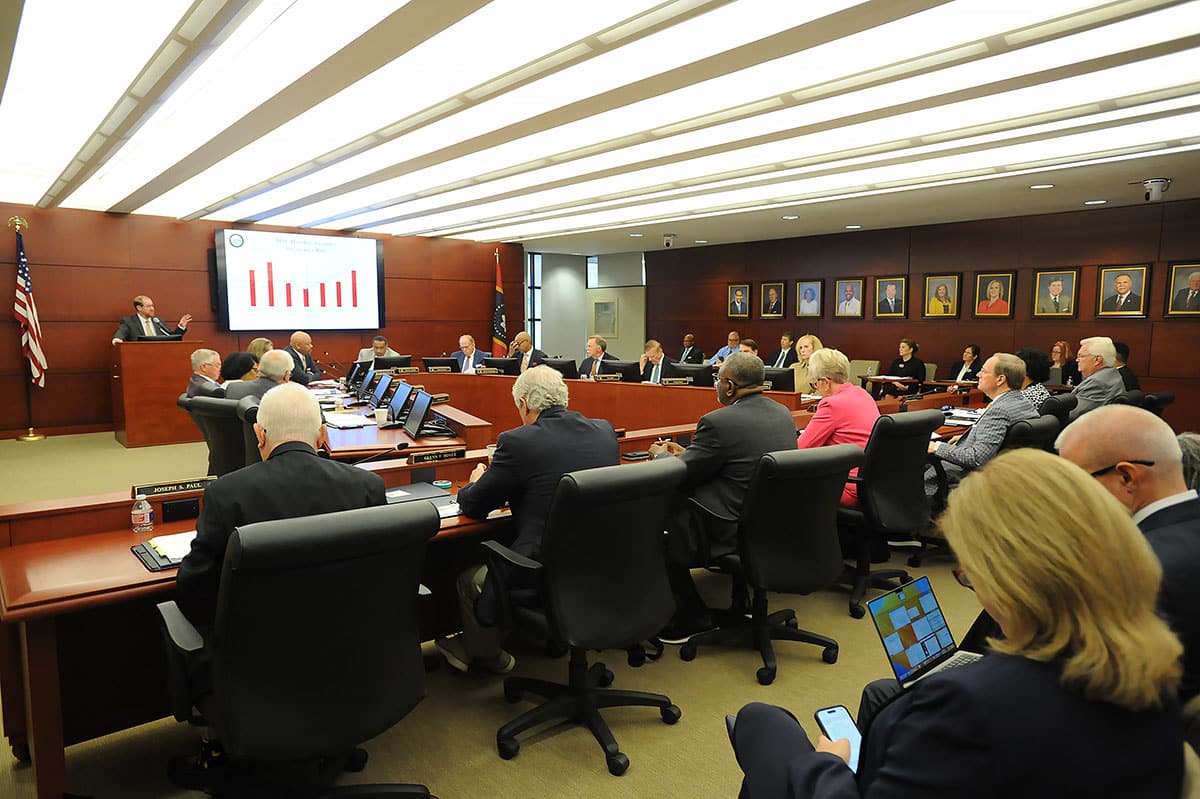Mississippi Today
IHL discriminated against JSU administrator in hiring Thomas Hudson in 2020, lawsuit alleges

The same day the governing board of Mississippi's public universities appointed one of its own to lead Jackson State University, a lawsuit filed in federal court by a former female vice president alleges she was discriminated against when Thomas Hudson was elevated to the position in 2020.
When the Institutions of Higher Learning Board of Trustees picked Hudson to lead the state's largest historically Black university, the lawsuit alleges it discriminated against Debra Mays-Jackson, who at the time had been the school's vice president and chief of staff since 2017. The lawsuit claims she had supervised Hudson, a special assistant to the president.
IHL appointed Hudson interim president in early 2020 when William Bynum Jr., the university's 11th president, resigned after he was arrested for procuring the services of a prostitute. Then IHL cut the search short that November to hire Hudson permanently despite promising, the lawsuit says, it would look for national candidates.

Had IHL conducted a full search and vetted Hudson, the lawsuit alleges, the board would have known at the time that he had sent “unwelcomed and uninvited photographs of his genitalia” to a JSU student and employee and that he had “demoted another JSU employee who complained about Hudson's unlawful conduct.”
“Upon information and belief, before naming Hudson President of JSU, Rankins and other IHL officials knew or should have known Hudson had engaged in conduct unbecoming a college president” the complaint states.
Three years later, Hudson became Jackson State's third permanent president in a row to resign after he was placed on administrative leave by IHL for reasons that still have not been made public.
IHL did not respond to questions from Mississippi Today, and Hudson did not return a call by press time. A Jackson State spokesperson wrote the university had no comment on the litigation.
The lawsuit names 11 current and former IHL board members, and the commissioner, Alfred Rankins. It asks a jury to award damages and make Mays-Jackson the new president of Jackson State.
On Thursday, IHL named Marcus Thompson, a deputy commissioner, the new president. He is slated to start Nov. 27. Thompson did not return a call from Mississippi Today by press time.
Thompson's appointment was applauded by many on social media, including Hudson.
“Extending a very personal and sincere Congratulations to Marcus Thompson on being named 13th President of @JacksonStateU,” Hudson wrote. “As a proud alumnus I am proud to stand in support as you work for the betterment of my Dear Old College Home.”
After Hudson resigned, IHL allegedly planned to make Thompson the president earlier this year until, the lawsuit states, Elayne Hayes-Anthony “garnered more support … during the executive session to discuss the matter.” She became the temporary acting president.
Before Hudson was a special assistant to the president, he had been the university's chief operating/diversity officer and Title IX coordinator, according to an IHL press release about his appointment. The lawsuit alleges he did not supervise any employees in his capacity as diversity officer.

As vice president, Mays-Jackson oversaw several key areas at the university, including enrollment management, student affairs and governmental relations, according to a post about her on Jackson State's website. She had also served as vice president of Hinds Community College's Utica and Vicksburg campuses.
It is unclear if Mays-Jackson ever got a chance to apply for the job.
On Feb. 10, 2020, the day Hudson was appointed interim president, the lawsuit alleges that he approached Mays-Jackson and told her “he was not qualified or prepared to serve as interim president” and gave her a $25,000 bonus so she would stay on board.
Three days later, Rankins met with Jackson State employees and told them that Hudson would not be permitted to apply for the position, the lawsuit states, claiming a national search would be conducted.
That was cut short after multiple speakers said they wanted Hudson to become permanent president after IHL conducted a virtual listening session in late October 2020. The lawsuit alleges that was the product of a campaign by Hudson for the job.
According to the lawsuit, IHL also already knew that Hudson, as diversity officer, and other Jackson State officials had “concealed complaints of sex discrimination and sexual harassment that female employees suffered at the hands of a male dean.” The female employees filed an anonymous complaint with IHL after Hudson allegedly failed to investigate the allegations.
After IHL apparently launched its own investigation, the lawsuit states the dean retired.
Mays-Jackson left Jackson State in August 2021, according to her LinkedIn.
This article first appeared on Mississippi Today and is republished here under a Creative Commons license.
Did you miss our previous article…
https://www.biloxinewsevents.com/?p=306873
Mississippi Today
On this day in 1964
May 2, 1964

Henry Hezekiah Dee and Charles Eddie Moore, two 19-year-old Black Americans, were simply trying to get a ride back home. Instead, Klansmen abducted them, took them to the Homochitto National Forest, where they beat the pair and then drowned them in the Mississippi River.
When their bodies were found in an old part of the river, FBI agents initially thought they had found the bodies of three missing civil rights workers, James Chaney, Andrew Goodman and Michael Schwerner.
Thanks to the work of Moore's brother, Thomas, and Canadian filmmaker David Ridgen, federal authorities reopened the case in 2005. Two years later, a federal jury convicted James Ford Seale. He received three life sentences and died in prison.
Ridgen did a podcast on the case for the CBC series, “Somebody Knows Something.”
This article first appeared on Mississippi Today and is republished here under a Creative Commons license.
Mississippi Today
Lt. Gov. Delbert Hosemann shuts down House Republican idea to let voters decide Medicaid expansion
After House Republicans asked Senate leaders to agree to a proposal that would place Medicaid expansion on November's statewide ballot, Senate leader Lt. Gov. Delbert Hosemann said the idea had no legs in his chamber and added that expansion talks were likely done for the year.
House Speaker Jason White, a Republican from West, announced the idea in a statement Wednesday night and pointed out it had become clear over the last few days that House and Senate Republicans were still far from agreement over the best way to expand Medicaid coverage.
The bill narrowly escaped death on Wednesday afternoon until House Democrats forced a procedural vote that granted everyone more time to find compromise.
“This session proved that a consensus has formed and we all share the same goal: to provide healthcare access to low-income Mississippians,” White said. “Creating a referendum process for this issue is a clear direction forward. We hope that our colleagues in the Senate will take this opportunity to finally hear from the electorate once and for all.”
About an hour after White announced the referendum idea, Hosemann poured cold water on the idea with a statement of his own.
“We had some discussions with senators today about the possibility of a non-binding referendum on the ballot and the idea was not well received,” Hosemann said. “We are disappointed in the outcome this year, but value the discussions which occurred this session — the first time this Legislature has seriously considered healthcare reform in our state.
“I remain committed to finding ways to increase access for working Mississippians who otherwise do not have the resources for a simple check-up or an extended hospital stay,” Hosemann continued. “A strong work requirement, with necessary exceptions, is a bottom line for many Senators. We look forward to continuing the conversation on access to healthcare in the future.”
READ MORE: Lawmakers buy one more day to reach Medicaid expansion compromise
The House's full proposal was not made available on Wednesday night, but White's statement said the proposed referendum would be two-fold: Voters would decide if they think Medicaid should be expanded to the working poor and if the program should include work requirements for recipients.
House Democratic caucus leadership supported the House Republican effort, saying in a statement Wednesday night that if the language in the House's referendum is “very clear” and allows working Mississippians to get the “health care we know that they need,” then they would likely support the new proposal.
“We are excited about the opportunity to finally give the people of this state a chance to voice what we know to be — that they want this, and they want it as quickly as possible,” read a statement from Reps. Robert Johnson and Daryl Porter, the House Democratic leaders.
The statewide ballot referendum idea was seen late Wednesday as a renewed chance for Republicans to find an expansion agreement — something that had become elusive during the first legislative session that expansion was earnestly considered.
At the heart of the Senate and House disagreement was a requirement that mandated Medicaid recipients work — a provision that the federal government had blocked in 13 other states.
House and Senate Republican negotiators earlier in the week agreed to a deal that would expand Medicaid only if a strict work requirement was approved by the federal government. House Republicans, who had previously proposed an expansion program that would go into effect even without federal approval of a work requirement, caved late Monday and agreed to the Senate Republicans' demand to include the make-or-break work requirement provision.
But House Democrats, who had for weeks vowed to not support any expansion plan that included a work requirement, fulfilled that promise on Wednesday and threatened to vote against the Republican bill on the House floor. The Democrats' dug-in position against the bill would likely have killed the proposal, which needed a three-fifths majority vote to pass.
Rep. Bryant Clark, D-Ebenezer, said he was one of 29 Democrats who would not vote for the agreement as it stood on Wednesday. He said he was unsure whether he would support the issue going to a statewide referendum.
“I think we as a Legislature should do it — that's what people hired us to do,” Clark said. “I wouldn't be just totally opposed to that idea, but sometimes the devil is in the details. What would be put before the people? Would it be a clean expansion proposal, or something else? I am 85% sure the citizens of Mississippi would pass something that is a clean Medicaid expansion proposal.”
Note: This article will be updated.
This article first appeared on Mississippi Today and is republished here under a Creative Commons license.
Mississippi Today
Lawmakers buy one more day to reach Medicaid expansion compromise
Facing a late Wednesday deadline, the House and Senate procedurally voted to give themselves at least one more day to deliberate a proposal that could make Mississippi the 41st state to expand Medicaid under the Affordable Care Act.
House and Senate Republican negotiators earlier in the week agreed to a deal that would expand Medicaid only if a strict work requirement for recipients was approved by the federal government. House Republicans, who had previously proposed an expansion program that would go into effect even without federal approval of a work requirement, caved late Monday and agreed to the Senate Republicans' demand to include the make-or-break work requirement provision.
But House Democrats, who had for weeks vowed to not support any expansion plan that included a work requirement, fulfilled that promise on Wednesday and threatened to vote against the Republican bill on the House floor. The Democrats' dug-in position against the bill would likely have killed the proposal, which needed a three-fifths majority vote to pass.
With the federal Centers for Medicare and Medicaid Services under the Biden administration unlikely to approve Mississippi's Medicaid expansion plan with a work requirement, Senate Republican leaders have expressed optimism that Donald Trump would be reelected and that he would approve Mississippi's plan.
However, the realpolitik is that Trump has loudly voiced his opposition to Medicaid expansion, and his approval of Mississippi's work requirement would usher expansion in for the Magnolia state over the wishes of a Republican governor (Tate Reeves) whom he supports. When he was president, the Trump administration approved Medicaid work requirements for some states, but only as a means of limiting participation where it had already been expanded, not to help a state implement expansion.
Waiting on approval from CMS under either Biden or Trump could keep Mississippi's expansion of coverage as it now stands in limbo indefinitely.
“We will vote for Medicaid expansion,” Rep. Robert Johnson III, the House minority leader, said after the recommittal on Wednesday. “This is not Medicaid expansion. At least we got a do-over.”
Johnson said that shy of going back to the original House position — or removing the work requirement the Senate demanded — House Democrats want to remove language that says the state would reapply for work requirements each year while expansion remains in limbo until such time as a work requirement is approved. He said the Democrats told the Republican leadership that they would agree to the work requirement, but not reapplying on an annual basis for the work requirement wavier. Instead, he said the state should apply once for the work requirement and if it is rejected by federal officials the Legislature should act to remove the requirement.
“We're not saying we are against the work requirement,” he said, adding House Democrats oppose it because it would keep Medicaid from being expanded,
Johnson added, “We're saying fine, we will try that once and show you it will not work, then we move on (removing the work requirement and expanding the program).”
When it was clear the House Democrats' dissension might kill the expansion program, House Republicans moved to recommit the bill to conference committee. The Senate Republicans followed suit a few minutes later, effectively extending the deadline for a final plan to be hammered out between House and Senate negotiators until 8 p.m. Thursday.
House and Senate Republican leaders declined to comment about what they may bring to the negotiations or what the next few hours may look like. House Democrats claimed a small victory and reiterated their desire to pass an expansion plan that would actually go into effect and provide health coverage to an estimated 200,000 Mississippians.
As news of the recommittal spread quickly through the Capitol on Wednesday afternoon, many people floated the notion of placing a Medicaid expansion issue on a statewide ballot, where voters could mandate what they wanted lawmakers to do.
“I have heard talk about that, but it would confuse voters with a work requirement,” Johnson said, adding he would support placing Medicaid expansion without a work requirement on the ballot.
Rep. Bryant Clark, D-Ebenezer, said he was one of 29 Democrats who would not vote for the agreement as it stood on Wednesday. He said he is unsure whether he would support the issue going to a statewide referendum.
“I think we as a Legislature should do it — that's what people hired us to do,” Clark said. “I wouldn't be just totally opposed to that idea, but sometimes the devil is in the details. What would be put before the people? Would it be a clean expansion proposal, or something else? I am 85% sure the citizens of Mississippi would pass something that is a clean Medicaid expansion proposal.”
As the extraordinary politics played out on Wednesday, dozens of clergy and other citizens came to the Capitol to express their support of expansion. Many Capitol attendees specifically said they did not support the compromise plan that included the work requirement.
“There are people in Mississippi who are sick, hurting, in pain and broken,” said the Rev. Dawn Douglas Flowers, a minister at Parkway Hills United Methodist Church. “We have a way to enter into that brokenness and offer healing right away. I hope lawmakers can find a way to compromise and allow Medicaid expansion to happen now because what they've come up with is just a delay. The work requirement will not allow us to get help to people who need help today. We can't just kick the can down the road any longer.”
This article first appeared on Mississippi Today and is republished here under a Creative Commons license.
-
Mississippi Today4 days ago
On this day in 1951
-
Mississippi News5 days ago
One injured in Mississippi officer-involved shooting after chase
-
SuperTalk FM3 days ago
Festival merger in Leland sets up one major event for Mississippi Delta
-
Mississippi News2 days ago
Two women accused of shoplifting across southeast captured in Mississippi
-
SuperTalk FM3 days ago
PERS bill set to phase in employer rate increase heads to governor’s desk
-
Mississippi Business1 day ago
Geartek expanding operations in Alcorn County
-
Mississippi News Video7 days ago
Vehicle fire blocks all lanes of I-55 South in Hinds County
-
SuperTalk FM6 days ago
Investigation underway after gun found in backpack of Ridgeland High School student










































